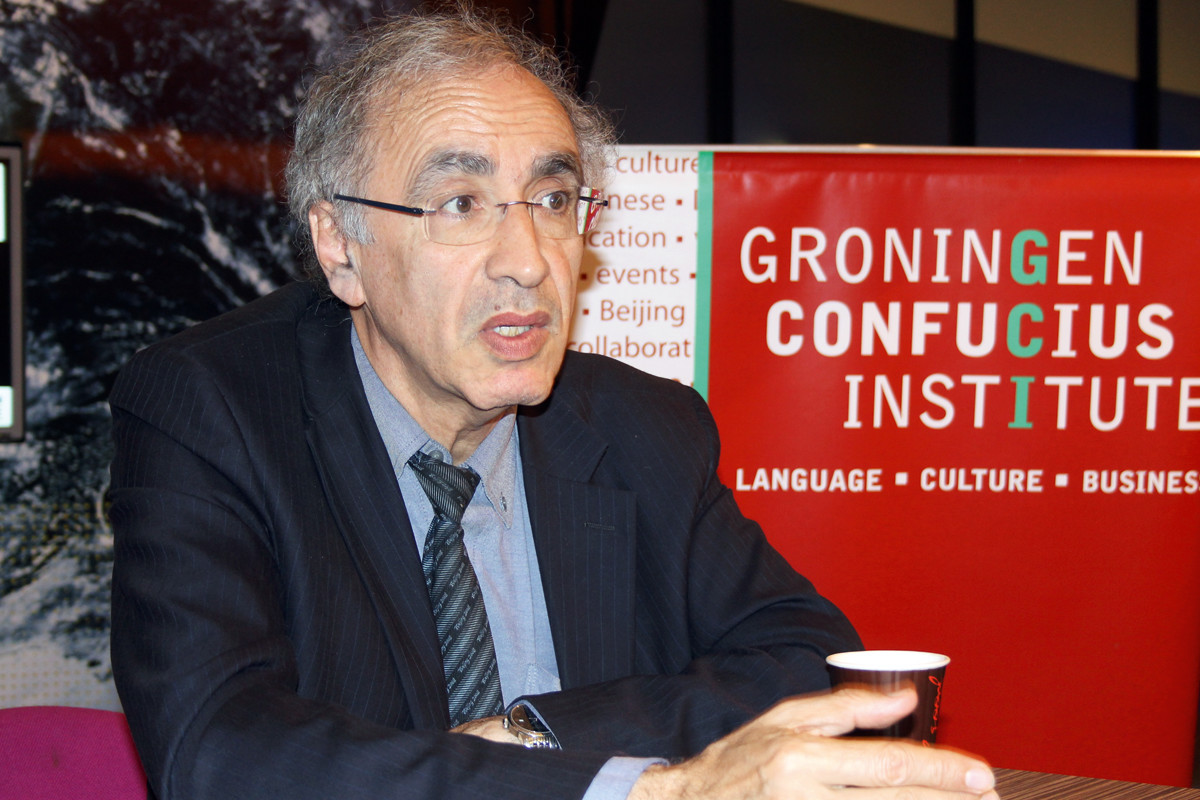Interview with Professor Joel Bellassen (白乐桑): A Frenchman’s Dedication to Chinese Teaching
Professor Bellassen, Inspector General of Chinese Language Teaching, Ministry of Education in France, is a distinguished sinologist in France and works as Professor of Chinese at the National Institute of Oriental Languages and Civilizations in Paris. He is founder and the first president of the Association for Chinese Teachers in France and Vice President of the International Society for Chinese Language Teaching.
Professor Bellassen, I’m so impressed by your authentic Chinese. I guess people would think you are a native speaker if they heard you on the radio. I am very curious about what motivated you to study Chinese.
This question is posed to me three to five times a week for the past forty years since I have studied Chinese. In 1969, I graduated from high school and took philosophy as my major at university. Just before I finished the first year study, reforms in French higher education system were underway, ones that required the students to implement two majors at the same time. For me, it was natural to select a foreign language, given my passion for languages. I initially selected Spanish but two weeks later I decided to drop this language as it was too close to French and far too common for me, opting instead for Chinese. I think the psychological factor of wanting to do something different was probably the key factor. I simply wanted to do something different. In the late 1960s, Chinese language did not have any career value, neither the lesser practical value for future travel to China.
Looking at this almost dead-end choice, what did your family and your friends say?
They felt very pitiful for my choice and asked me why. I told them: “just for the day that I would be asked why”. But after years, I figured out that I like this distant language and culture. I pursued something different subconsciously. My classmates soon gave me a nickname: Chinese. “Hello, Chinese!” was a way to greet me among my classmates.
Can I conclude that you like to do something challenging?
I think challenging is a good word. From the aspect of psychology, there are two basic types of people: one who likes routines and regularity; the other who likes dynamics and challenges. I noticed from later experience in teaching Chinese that some children never experience Chinese as difficult to learn. They just like doing things that are challenging to them, enjoying the process along the way. The children enjoy the language that has no letters but thousands of characters. They have great fun in accumulating their knowledge of characters from several to hundreds.
I can imagine they have good teachers like you, but what about your Chinese teachers in the 1960s?
Do not forget I am from France! In 1969 in Paris, there were three Chinese departments in different universities. Among my first teachers, there was Professor. Li Zhihua(李志华), a Beijing native who came to France in 1947 and translated A Dream of Red Mansions (《红楼梦》Hónɡlóumènɡ) in the 1980s; there was a Hong Kong(香港) journalist and a teacher from Switzerland; and a French young lady who held a master’s degree in sinology and spoke fluent Chinese. 2014 would be the fiftieth year that China and France established diplomatic relations. In 1964, President De Gaulle started diplomat relations with China and sent the first array of French students to China, among whom a number of students became famous sinologist later. I was one of the students sent to China in 1973.

When you arrived in China, what differences did you find in studying Chinese?
I never thought I could go to China when I studied in France: efficiency was low, although interest in the language was really high. My reading ability was not good. Arriving in China in 1973, which was the later period of Cultural Revolution, we felt that everything was different from what we imagined it would be under these special circumstances and in this special period. I felt so blessed to have such a precious experience! It might be hard to understand as a Chinese person, but we even led a different life from the French diplomats as we lived in a real Chinese environment among Chinese classmates and Chinese people. It was just like we went to the moon, where you never complain about the poor living condition, but are excited about everything new. I went to the countryside of China twice and got the opportunity to learn about the real China. It was after the special approval process that I was allowed to go. That was very precious in my memory.
When you came back to France after studying in China, why did you choose teaching Chinese as your career?
In the 1970s, a French person who is proficient in Chinese was very precious. So it was really easy to find a position as a senior translator or diplomat. But I chose to teach the language just because I like communication. My father was a teacher and also a conductor of a band. I learned teaching as a way of communication is highly related to communication arts and skills, both of which interact closely. But it’s not aware among the majority of people. If we take communicative ability as a required qualification when we hire a teacher, the efficiency of teaching will surely double.
Could you give some examples about how good communication skills will help with Chinese teaching?
A good way to educate students is to cultivate their concept of future planning. If you say to your students we need to review what we have learned today, the efficacy would not be immediately obvious. But when you say that we will use the knowledge we learned today in two weeks’ time when we go to Chinatown, it makes a big difference. I also incorporate my own story in China with the students’ future planning. The motive of language study is nurtured in the goal-setting procedure, such as the premise that you will visit China in six months using this language to ask for directions, and it works very efficiently. I attach emphasis to cultural differences and even exaggerate the difference in my teaching as that works well in aiding understanding.
Maybe your title as the Inspector General of Chinese teaching in France itself is a good illustration on how much effort you have given and the successes you have to your name in the classroom delivery of the Chinese language. Could you explain exactly what this position entails?
The position of inspector was created by Napoleon. The inspectors are expected to be experts with independent and insightful ideas in certain areas and they are directly responsible for the ministers. Chinese language education is something very special in France as dozens of middle schools have had Chinese in their formal curriculum since 1977. Based on the fact that Chinese language was an examination subject on graduating from high school, a professor from the University of Paris was appointed as a part-time Inspector of Chinese Teaching, who was in charge of examination design and approval. At that time, we had a simple syllabus since the Chinese language was a part of the formal curriculum in primary education. In 1998, the part-time Inspector retired and I was appointed to this position since I was the President of the Association of Chinese Language Teachers in France. From then on, I embarked on a very dedicated journey to develop Chinese teaching across the country. The position of Inspector of Chinese Teaching has become a full-time position since 2006 due to the fast expansion and development of the subject. I place great emphasis on developing an already established syllabus.
Why do you think it so important to have an established syllabus in Chinese teaching?
An established syllabus makes Chinese a true subject or discipline in France. That is also the requirement of all the subjects in the formal curriculum. In the Netherlands, there is no syllabus in Chinese teaching yet. That is the big difference. I figured out the key point of promoting the language is to make it an examination subject in basic education system nationwide. It should not depend on higher education or Confucius Institutes. We came to the conclusion from decades of experience that Chinese teaching should start from primary school as Chinese is a distant language to Western people and we shouldn’t wait until students get to higher education.

‘Distant’ is an interesting word to describe the Chinese Language. How, based on your numerous visits, would you describe China?
I believe uniqueness is a good way to describe both the language and the country. For me, China is a whole picture connecting modernity and tradition. It is a pity, to some extent, that China is placing more attention on modernisation but is cutting the connection to tradition and history. China is the country I know best outside of France and I enjoy reading Tang poems (唐诗Tánɡshī) very much. One consistent feature in China is the morning exercises, which remains my constant curiosity. If you want to know about the identity of Chinese people, you must go to Beihai Park (北海公园Běihăi Gōnɡyuán) and experience this special Chinese routine, which is an original and authentic element of Chinese culture and identity.
Interesting perspective! It must be very appealing for your students to know about this special Chinese culture.
That is the reason I usually exaggerate the cultural differences. It will make it easier and more fun to learn the language and culture. I really dislike the rumour that Chinese is difficult to learn. I never use easy or difficult to describe the Chinese language. French people never claim Chinese is difficult. In most cases, they think Chinese is beautiful, mysterious, complicated. I don’t use the word easy, either. Can you give an example of an easy subject? For me, mathematics is just a nightmare! Comparatively, Chinese characters are much easier.
I know you have a 400 Characters threshold for Chinese learner to achieve the basic communication ability in Chinese. How did you define the scope?
The economical principle of using less to achieve more applies to Chinese language study as well. Chinese is the only language that consists of two basic units: character and word. For example, the word is the only unit of French and it is easy to define frequently used words. But in Chinese word and character have a different frequency of use; sometimes they are even paradoxical. For example, the word Sprite (雪碧Xuěbì) is a frequently used word, but the character碧is not all that frequently used.
In France, we hold true a theory that in the fundamental phase of learning Chinese, students should master 400 most frequently-used characters, and we object to learning characters in a scattered way or use the words as basic units instead of characters. We developed the 400 Characters Threshold in 1985 so that high school students could easily set a goal for knowing more characters. There is no French explanation for the 400 characters. As a result, many students copied the page and pasted it on the bed or the wall, checking newly acquired characters marked with different colours every day. As you can see, this threshold is an effective psychology for the student to learn the characters and works especially well for students preparing for the university entrance examination.
Brilliant idea to have a 400 character threshold! Can I request your permission to publish it in the back cover for our readers’ reference?
Yes, sure! It’s my pleasure. Actually we also have another form with 900 characters. We mark the tones with colours so that the students can get the whole picture of the characters.

 Share on Facebook
Share on Facebook Share on Twitter
Share on Twitter Share on LinkedIn
Share on LinkedIn